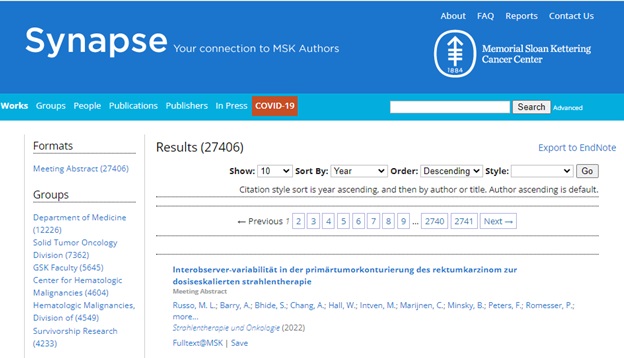- A new study by researchers at Washington University in St. Louis challenged an established view of sugar as a cancer driver because of the cancer cells’ high glucose uptake.. The study demonstrated that cancer cells don’t use all the energy from glucose but discard most of it as waste. Until now, the rate of glucose consumption by cancer cells was used in cancer diagnosis and staging. Also, avoiding access to dietary sugar has been viewed as one of the anti-cancer strategies. The new findings don’t support the role of glucose metabolism as a good therapeutic target in cancer. The study was published in Molecular Cell.
- An international group of researchers, funded by Cancer Research UK, have developed a technique called spatial transcriptomics, which allows non-invasive mapping of tumors at a very high-resolution depth. The researchers have created a detailed three-dimensional prostate map, including both healthy and cancerous cell areas. The study also discovered that individual prostate tumors have multiple genetic variations and revealed that healthy tissue in a prostate already had genetic characteristics associated with cancer. The new technique will help study the characteristics and development of cancer on a cellular level. The technique and the finding of the study will have a significant impact on cancer diagnosis and treatment. The study was published in Nature.
- Researchers at the Georgia Institute of Technology developed a revolutionary detection method that shows how cancers metastasize and what stage they are. They created a new type of chip called the Cluster-Well, which can capture circulating tumor cell (CTC) clusters in blood, which are the vehicles of tumor spread. According to the Principal Investigator on the study, this new technology allows circulating tumor cell clusters “virtually in any cancer to be accessed with precision and practicality that has not been possible before.” The study was published in Nature Communications.
- A researcher at the University of Alabama at Birmingham School of Public Health conducted a retrospective study to evaluate the long-term relationship between cancer and Alzheimer’s Disease. The findings supported the pattern already established by the prior research into a short term relationship, that of the inverse relationship between the two conditions: “…dementia patients with cancer history demonstrated better cognition at dementia diagnosis and declined slower than dementia patients without cancer history”. The study was published in Journal of Alzheimer’s Disease.
- Researchers at the University of Southern California have found that exposure to “forever chemicals,” also known as PFAS, which are chemicals used in nonstick cookware and certain types of makeup, is associated with elevated liver cancer risk. The study was published in JHEP Reports.
What is OpenAthens and How Does it Affect Your Research
OpenAthens is an identity and IP-based authentication system that provides access to the Library’s licensed online resources via single sign-on (SSO) technology. It is replacing our previous system, EZproxy.
Now when you are remote, you will be able to use your MSK credentials (username and password) to sign on with the MSK secure single sign-on, regardless if you are on or off of VPN. There should be no change to access when on-campus.

We still strongly recommend navigating to the Library’s Remote Access (top right corner of the library’s website) first to access library resources and subscription content.
In some cases, you may be prompted by Open Athens to select your institution; simply go to Find your institution and select “Memorial Sloan Kettering Cancer Center”.
Please refer to this LibGuide on Open Athens for further information. For questions regarding Open Athens or access issues, please reach out to resources@mkscc.org.
Authoring Published Meeting Abstracts – Searching for Upcoming Conferences for Submitting Your Work
There are a few approaches that you can take for identifying upcoming conferences that may be appropriate venues for sharing your preliminary research results (as a peer-reviewed paper or poster presentation).
- One way is to search a database that contains information about the conferences/congresses themselves. Another way is to identify professional associations/organizations related to your discipline/field that would likely be responsible for organizing professional meetings, and then search the website of these organizations to look for announcements of their upcoming events and professional development opportunities.
For example, you can use a database like PubsHub that indexes Congresses and Associations:
PubsHub: https://libguides.mskcc.org/pubshub
Many people are familiar with PubsHub as they may have used it when trying to identify good journal contenders for manuscript submission. It’s a great tool to use for that purpose – it even has functionality that lets you easily compare the features of two different journal titles – but there are also parts of this database dedicated to Congresses and Associations.

- Another effective way to find this information is to search on your favorite topic in a scholarly literature database that indexes conference proceedings, limit your search results to the Meeting Abstracts/Conference Proceedings publication type, and then note the names of the conferences where these meeting abstracts were submitted and accepted.
For example, you can search a database that indexes conference proceedings of interest and then look up the conference names included in the citations that are returned (from the citation record/published meeting abstracts records that were presented on topics related to yours) using another search tool (like Google) to investigate if those conferences/associations will soon be accepting abstract submissions for their next conference.
Resources available via the MSK Library that index conference proceedings/meeting abstracts include:
- Web of Science – https://libguides.mskcc.org/webofscience
- Northern Light Life Sciences Conference Abstracts – https://libguides.mskcc.org/northernlight
- Synapse – https://synapse.mskcc.org/synapse/works

Questions? Ask Us at the MSK Library.